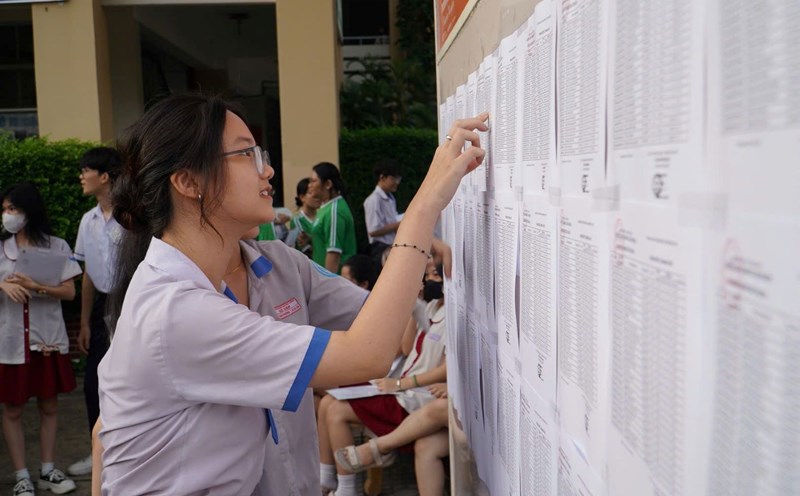The Ministry of Education and Training is developing a roadmap for implementation
The Prime Minister requested the Ministry of Education and Training to continue researching, soon have a specific roadmap and plan to build a large enough exam bank, ensure quality, and closely follow the general education program; develop a Project to prepare the necessary conditions to pilot the organization of computer exams in some localities from 2027, aiming to organize the high school graduation exam on computers as soon as possible.
According to the original image, this exam format has many similarities with the current competency assessment exam of Hanoi National University. Candidates do the test directly on the computer, each person has their own exam and will know the results immediately after completing the exam.
In terms of security, the entire process of doing the test and data will be saved by the computer system. If the candidate commits fraud, the system can track and detect it in time.
Many experts support and believe that implementing a national exam such as high school graduation will ensure objectivity and prevent exam fraud.
In Hanoi, some private schools also implement computer-based testing. For example, at Luong The Vinh Secondary and High School, in the recent 6th grade competency assessment test, nearly 4,000 students took the exam on computers through the LTV Exam software deployed internally by the school. Students can operate directly on computers arranged in survey rooms with a simple, easy-to-use interface. The exam schedule is divided into 4 shifts (2 morning shifts and 2 afternoon shifts) to ensure the material conditions with the number of contestants attending.
Ms. Van Thuy Duong - Vice Principal of the school - said that the school has strictly implemented the transition to computer test-taking to increase synchronization in organization, support more objective scoring work and create conditions for students to get acquainted with the form of technology testing, which is increasingly popular in general education today. After submitting the test, candidates can immediately see the results on the system.
Mr. Lam Trieu Nghi - Principal of Nguyen Thuong Hien High School (HCMC) assessed that if the pilot is implemented in large cities such as HCMC and Hanoi, it will be completely feasible. For example, at this school, there are 4 engine rooms, each room has enough computers for a class with about 46 students. Thus, in terms of facilities, it is initially possible to meet the requirements of organizing exams on a machine.
Sharing the same view, Mr. Huynh Thanh Phu - Principal of Bui Thi Xuan High School (HCMC) - said that the computer-based high school graduation exam requires a methodical roadmap.
"It can start from 2026 with the pilot program in grade 12, at schools with qualified facilities, deployed on a voluntary basis. At the same time, we should organize a semester test and a test on the machine so that students can get acquainted" - Mr. Phu suggested.
On the side of the Ministry of Education and Training, to ensure successful implementation, the ministry is developing a preparation roadmap, including: Standarizing exam questions according to formats suitable for computer exams; Investing in equipment for machine rooms at schools; Strengthening network security and data; Developing and promulgating new exam regulations; Roadmap for national application after 2030...
Deputy Minister of Education and Training Pham Ngoc Thuong affirmed that currently, the graduation exam on computers is only piloted in some qualified places.
The goal is to expand nationwide after 2030, he said.
need to prepare carefully
From the expert's perspective, Dr. Hoang Ngoc Vinh - former Director of the Department of Vocational Education, Ministry of Education and Training - acknowledged that, in addition to outstanding advantages, the form of the exam on computers also faces some limitations and challenges: Uneven technical infrastructure, especially in disadvantaged areas. Building a high-quality, standardized testing bank to ensure fairness for the testing sessions is extremely complicated and poses a potential risk of high-tech fraud if there are no strict security measures.
The team of exam preparation officers needs to be well-trained. Teachers and candidates must be trained thoroughly. Facilities and equipment must be guaranteed, the network system must be stable and backup, especially in pilot areas.
Regarding the roadmap, experts say that it should start from large cities, then gradually expand.
From the stage of building, testing the test, to system management and supervision, every stage requires dedication, accuracy and honesty. The test bank must be standardized to ensure fairness, authenticity, accuracy, validity and reliability. success will depend on careful preparation, especially the professionalism of the test Takers, said Mr. Vinh.












